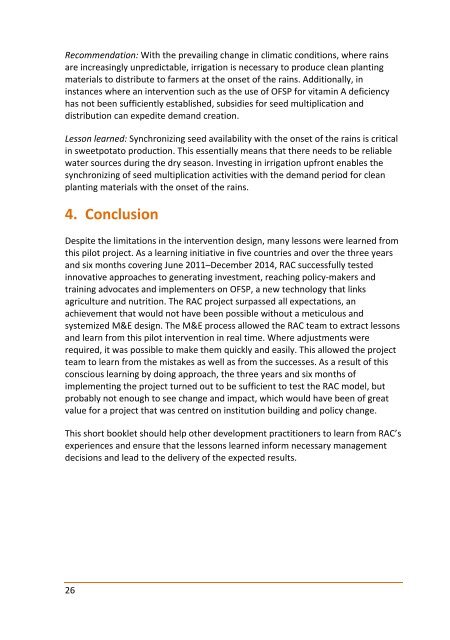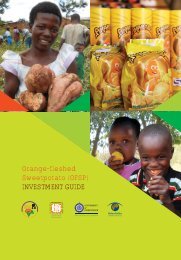Recommendation
Up89Y
Up89Y
Create successful ePaper yourself
Turn your PDF publications into a flip-book with our unique Google optimized e-Paper software.
<strong>Recommendation</strong>: With the prevailing change in climatic conditions, where rains<br />
are increasingly unpredictable, irrigation is necessary to produce clean planting<br />
materials to distribute to farmers at the onset of the rains. Additionally, in<br />
instances where an intervention such as the use of OFSP for vitamin A deficiency<br />
has not been sufficiently established, subsidies for seed multiplication and<br />
distribution can expedite demand creation.<br />
Lesson learned: Synchronizing seed availability with the onset of the rains is critical<br />
in sweetpotato production. This essentially means that there needs to be reliable<br />
water sources during the dry season. Investing in irrigation upfront enables the<br />
synchronizing of seed multiplication activities with the demand period for clean<br />
planting materials with the onset of the rains.<br />
4. Conclusion<br />
Despite the limitations in the intervention design, many lessons were learned from<br />
this pilot project. As a learning initiative in five countries and over the three years<br />
and six months covering June 2011–December 2014, RAC successfully tested<br />
innovative approaches to generating investment, reaching policy‐makers and<br />
training advocates and implementers on OFSP, a new technology that links<br />
agriculture and nutrition. The RAC project surpassed all expectations, an<br />
achievement that would not have been possible without a meticulous and<br />
systemized M&E design. The M&E process allowed the RAC team to extract lessons<br />
and learn from this pilot intervention in real time. Where adjustments were<br />
required, it was possible to make them quickly and easily. This allowed the project<br />
team to learn from the mistakes as well as from the successes. As a result of this<br />
conscious learning by doing approach, the three years and six months of<br />
implementing the project turned out to be sufficient to test the RAC model, but<br />
probably not enough to see change and impact, which would have been of great<br />
value for a project that was centred on institution building and policy change.<br />
This short booklet should help other development practitioners to learn from RAC’s<br />
experiences and ensure that the lessons learned inform necessary management<br />
decisions and lead to the delivery of the expected results.<br />
26



